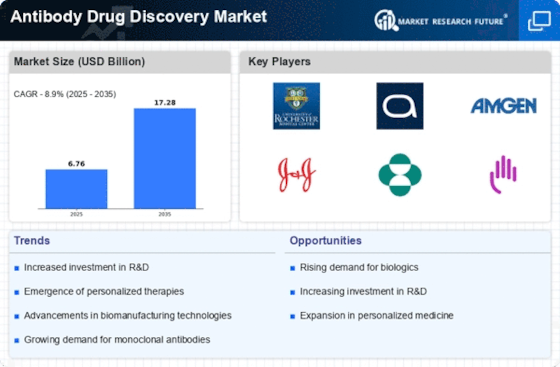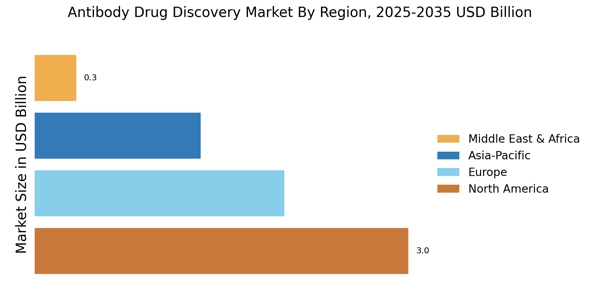Advancements in Biotechnology
Technological innovations in biotechnology are transforming the landscape of the Antibody Drug Discovery Market. Breakthroughs in genetic engineering, monoclonal antibody production, and high-throughput screening techniques are enhancing the efficiency and efficacy of drug discovery processes. For instance, the advent of CRISPR technology has enabled precise modifications in antibody structures, potentially leading to more effective therapies. The market is witnessing a shift towards more sophisticated platforms that facilitate rapid development and testing of antibody candidates. As a result, the overall productivity of antibody drug discovery is expected to improve, attracting investments and fostering collaborations among research institutions and pharmaceutical companies. This dynamic environment suggests a promising trajectory for the Antibody Drug Discovery Market.
Regulatory Support for Biologics
Regulatory agencies are increasingly providing favorable frameworks for the approval of biologics, including antibody therapies, which is a crucial driver for the Antibody Drug Discovery Market. Streamlined approval processes and incentives for orphan drugs are encouraging pharmaceutical companies to invest in antibody drug development. The introduction of guidelines that facilitate faster clinical trials and market entry for innovative therapies is likely to enhance the attractiveness of antibody drugs. As regulatory bodies recognize the therapeutic potential of biologics, the market is expected to expand, with more products receiving approval for various indications. This supportive regulatory environment is indicative of a positive outlook for the Antibody Drug Discovery Market, as it fosters innovation and expedites access to life-saving treatments.
Rising Prevalence of Chronic Diseases
The increasing incidence of chronic diseases such as cancer, autoimmune disorders, and infectious diseases is a primary driver for the Antibody Drug Discovery Market. As these conditions become more prevalent, the demand for innovative therapeutic solutions intensifies. According to recent estimates, the global burden of chronic diseases is expected to rise significantly, necessitating the development of targeted therapies. Antibody-based treatments have shown promise in addressing these complex health issues, leading to a surge in research and development activities. Pharmaceutical companies are investing heavily in antibody drug discovery to create effective treatments, thereby propelling market growth. This trend indicates a robust future for the Antibody Drug Discovery Market, as stakeholders seek to meet the growing healthcare needs of diverse populations.
Increased Demand for Targeted Therapies
The shift towards personalized medicine and targeted therapies is reshaping the Antibody Drug Discovery Market. Patients and healthcare providers are increasingly favoring treatments that are tailored to individual genetic profiles and disease characteristics. This trend is driving the development of monoclonal antibodies that specifically target disease mechanisms, thereby improving treatment outcomes. Market analyses suggest that the demand for targeted therapies is expected to grow, with antibody drugs playing a pivotal role in this evolution. Pharmaceutical companies are responding by prioritizing research on antibody candidates that demonstrate specificity and reduced side effects. This focus on precision medicine is likely to enhance the market potential for the Antibody Drug Discovery Market, as it aligns with the broader healthcare shift towards more effective and personalized treatment options.
Growing Investment in Biopharmaceuticals
The surge in investment within the biopharmaceutical sector is significantly influencing the Antibody Drug Discovery Market. Venture capital funding and public-private partnerships are increasingly directed towards the development of antibody-based therapies. Reports indicate that the biopharmaceutical market is projected to reach substantial figures in the coming years, with antibody drugs accounting for a significant share. This influx of capital is facilitating advanced research initiatives and accelerating the translation of laboratory discoveries into clinical applications. Furthermore, the competitive landscape is evolving, as new entrants and established companies alike strive to innovate and capture market share. This trend underscores the potential for growth within the Antibody Drug Discovery Market, as financial resources are channeled into promising therapeutic avenues.


















